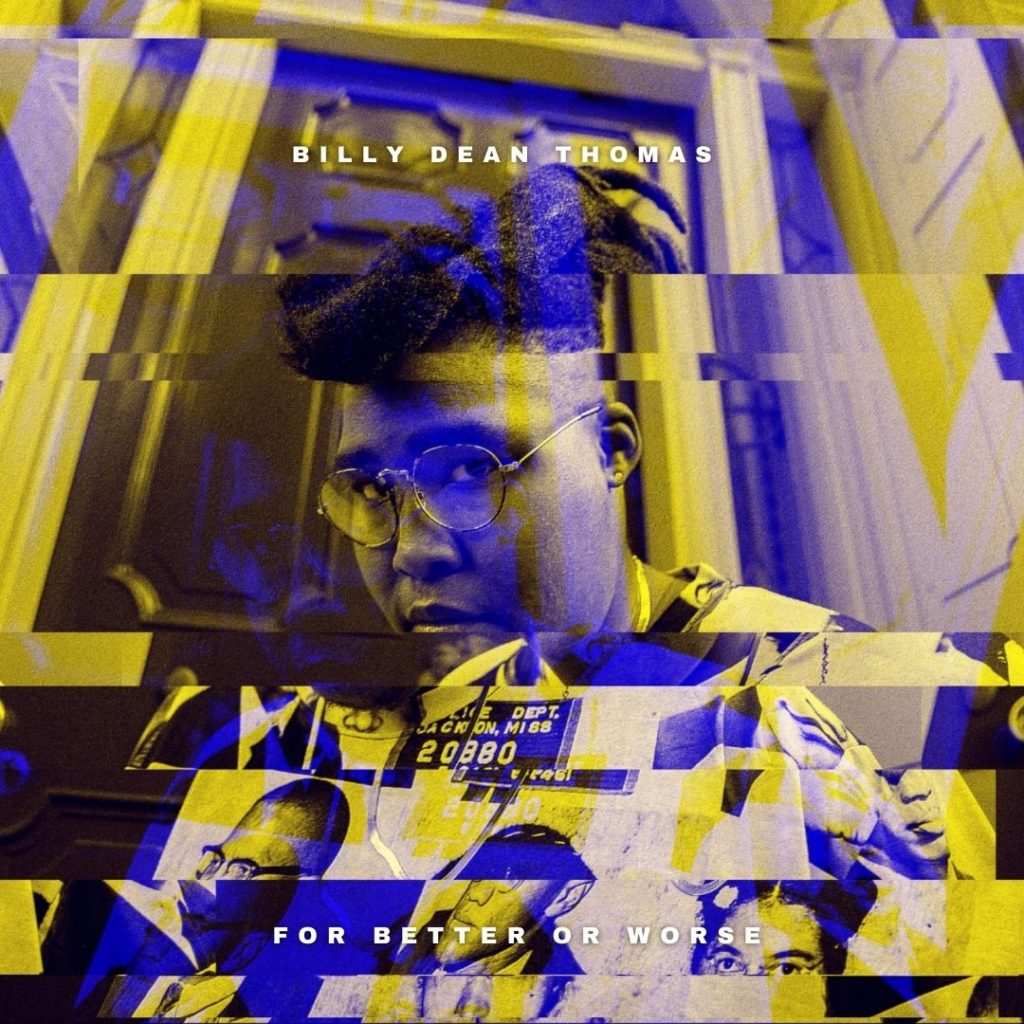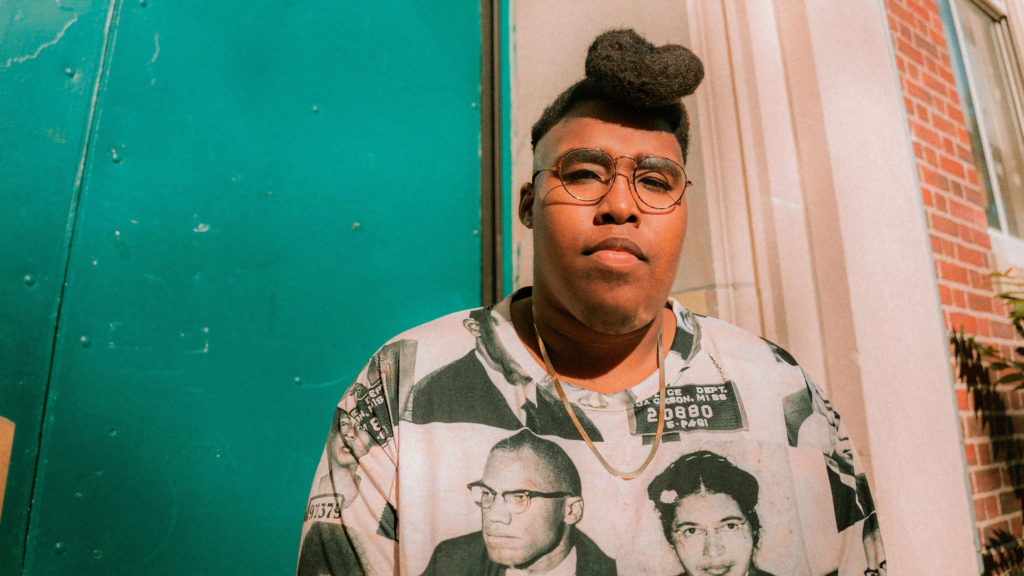Photo courtesy of the artist
Billy Dean Thomas raps like they have something to prove. In the past, they were trying to showcase their technical skills — like spitting verses quickly or fine-tuning the production of a track — but for their latest EP For Better or Worse (out now), they decided to let their songwriting shine. Hearing how they wrote hooks on the first take sounds like sheer magic, but it’s clearly the culmination of years of honing their craft, plus they finally allowed themself to be raw and vulnerable with their lyrics.
This interview has been edited for length and clarity.
ALLSTON PUDDING: As someone who’s been rapping since you were 10, how did music evolve from a hobby to something you wanted to pursue professionally?
BILLY DEAN THOMAS: For me, it started out as articulating my frustrations. I didn’t talk much as a young person until I started going to therapy. I had struggles with family and the school system, so then I started playing music— I was a drummer originally. Then as I got older (in high school), I started to transition to more spoken word and focusing on the writing of it.
AP: How did you craft your sound to the kind of hip hop artist that you are today?
BDT: In the beginning, I spent a lot of time on music production, more of the day-to-day functions in the production realm. The sound comes out more naturally while I’m producing, molding in my love for the production beats and instrumentation, and the final sprinkle on top is the lyrics. The vocals become a tie-in piece to finish up the track. In that phase of my life, my influences were primarily producers and songwriters.
This time [with For Better or Worse] is special. I just let go for half of the project. I stopped thinking so much. Over the last three years especially, I’ve been trying to prove myself on tracks: trying to showcase how fast I can rap, trying to show all of my skills, but sometimes that doesn’t make for the best music. I tried to practice being an overall songwriter as a whole — what’s going to make me feel good at the end result of the record?
I’ve been leaning into feeling as opposed to logistics, playing the beats and pushing “record” during the first time hearing the instrumentals, which is totally different from how I normally do it — I would spend 3-5 days or a week listening to beats first and trying to craft a concept. The first take ended up being the entire hook. I was feeling the emotions the first time I heard the music, which was pretty bizarre when I was doing it. I was surprised too while I was freestyling to go with the music and mumbling and “comping” — literally, to have this gibberish and it’s emoting something — those moments are really telling. My subconscious is saying words I’m not aware of.

AP: After graduating college, why did you decide to move to Boston instead of returning back to New York City? How did that decision influence the direction of your career?
BDT: The reason my raps become so fast is because I’m channeling my anxiety — I’m panicking on a beat. For me, New York is really overwhelming. Gentrification was already creeping up when I left. I have a lot of family still there but I couldn’t imagine paying rent there as an adult, I couldn’t begin that process of walking down the street I have to pay for. Moving to Northampton, being at Smith, was eye-opening. I could calm down and hear myself think. I was appreciating the morning dew and the silence. Being able to have that serenity, I didn’t want to let that go. Northampton is super queer and it was my new home, so the closest city nearby was Boston.
My first band was New England-based and one of my bandmates was in Boston, my current partner who I had started dating at that time was in Boston, and I got into Berklee for a second bachelor’s at the time. Everything was lining up. Then I talked about this in Rocky Barboa, where the whole premise was that everything was set up, then when I moved, everything collapsed — I lost the band, I dropped out of Berklee — but I stuck through it. This project shows the strength of the relationships that are still thriving and how I’ve grown into myself as an artist and a person and my identity.
AP: I noticed “Trust No Mo” and “Be Well” kind of go hand in hand, talking about career successes and the people who might try to use you because of that. What have you learned as part of being a successful artist and/or growing up in general?
BDT: Right now, I’m learning more than ever that the only validation I need is from myself. The biggest lesson is that asking for advice is great, but following my intuition is greater. I’m nervous about sharing my work with the world so personal, but I’ve got to lead with my gut.
AP: What was the first song you started working on the For Better or Worse EP and then how long did it take for it all to come together?
BDT: Think first was “Trust No Mo,” I made it a few years ago. I’ve been holding [some of my songs] hostage because I want to put out a legitimate album, a full throttle album, but I haven’t been able to get to that point. I’ve been keeping a couple for that big debut. So about half of the project I started between a year and half to two years ago, and the other half was at the beginning of lockdown in March.
AP: Can you talk about the two quotes this EP is inspired by? [James Baldwin said, “I love America more than any other country in the world, and, exactly for this reason, I insist on the right to criticize her perpetually,” and Pauli Murray said, “When my brothers try to draw a circle to exclude me, I shall draw a larger circle to include them.”] Was this always the goal of this project, or did old songs just naturally fit in with this theme?
BDT: Those two quotes are the embodiment of the entire project, they explain the project better than me. They’re perfect in every way. They demonstrate the subject matter — James Baldwin is 100% the whole project and Trump; then Pauli Murray is what “N.A.P.” is about, the challenges that exist as a nonbinary person around cis men and Black men. Even when they’re trying to ostracize me, it’s still my responsibility to my community even as they try to push me out. It’s important to remember and know the framework I’m working with. People may be prejudiced against me, but I still care about your future.
It’s crazy that these people are gone. It’s less coming from just me, it’s carrying my favorite icons — not icons, but more…mentors — carrying them with me. The image of the [album’s] cover art, that t-shirt [I’m wearing] is the image of carrying them with me, bringing them back to life. People trying to erase them. I am not just me, I am all of these people.
AP: Everyone is talking about how 2020 has been a pressure cooker of a year politically, but of course it’s only highlighting injustices that were always there. Why did you decide to write “Trump vs. Biden” and release it now?
BDT: After I heard the news that Biden was the candidate, I went into the studio. It was my first time hearing that beat but I pushed “record” and started rambling about Trump and Biden. It was emotional. Normally I’m not clickbait-y; on-the-nose is not usually my style. But everything is so heavy and confusing, it’s creating this disillusion.
The reason for releasing [the track] and the whole project now, is that I want to showcase the week before the election as part of this moment of not knowing what’s going to happen, the anticipation before getting final results — like on Maury, waiting to see if they’re the father [laughs]. People have asked me, “Why not release it the week after?” But for better or worse, we’ll see what happens. Regardless of what occurs, we have to focus on thriving in our environment, even if it’s horrible. I’m thinking of the Civil Rights movement or the stock market crash — these intense catastrophic events — people have gotten through them and lived through them, so we can’t just give up. Yeah, you feel awful and need to find inner peace, but you can’t just collapse, you need to work towards some sort of hope or joy.
AP: How do you know S’Natra and what was the collaboration process like for their verses?
BDT: We’ve been in each other’s lives since almost a decade ago. We were homies in New York, we met in Harlem. He’s a couple years older but we were in the same circles for years. We hadn’t spoken in a long time, but I was working on the track thinking of the chorus and first verse, and I needed another voice to have a conversation with multiple perspectives, not just me. I wanted that New York flavor and flow. This person who knew me since I was 18 with my whack rhymes. This track is made with someone who inspired me, he’s one of the best rappers I knew as a teenager, I was blown away. He nailed the imagery, the moment we’ve all been experiencing — watching these people commit crimes…I couldn’t imagine a better collaborator.
For Better or Worse is out now, listen below:

